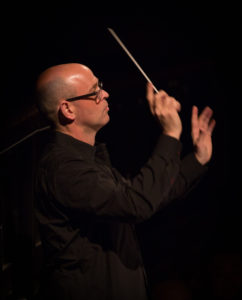
Q & A: Gil Rose On Resurrecting Saint-Saëns’ ‘Henry VIII’
By Nicole Kuchta(Credit: Kathy Wittman)
Boston’s Odyssey Opera has revealed that it will be “crossing the pond to merry old England” for its seventh season, which will feature a plethora of rarely performed Tudor-themed operas by a variety of composers.
The company’s Founder and General-Artistic Director, Gil Rose, recently shared some insight with OperaWire on the upcoming season, particularly its exciting opener: a quasi-premiere of French composer Saint-Saëns’ “Henry VIII.”
OperaWire: What inspired Odyssey Opera’s Tudor-centric 2019-20 season lineup?
Gil Rose: Well, let’s see . . . I think that there were several operas in the season, particularly Saint-Saëns’ “Henry VIII” and the premiere of Arnold Rosner’s “The Chronicle of Nine,” that were kind of on my radar to do. I realized there was a connection between them, so I worked it out from there and built up a whole season that explored the Tudor family, including Pacini and Rossini, and Edward German and Benjamin Britten.
OW: The season will open with Camille Saint-Saëns’ “Henry VIII.” What excites you about this production?
GR: It’s a concert performance – we’ve started to have a tradition going here of every September opening the season with a large, grand opera that we do in a concert performance, not staged. Usually, as grand opera tend to be, they’re not short but they are big. And this production is particularly interesting to me because we’re working with British musicologist Hugh MacDonald, the world’s expert on Saint-Saëns’ stage works. We’re basically directing what the composer’s original intentions were. The first performances were cut considerably against the composer’s wishes. We’re putting back all of that music. So in a strange way, we’re giving a world premiere of an opera that was written a hundred-forty years ago.
OW: What sort of major themes and/or powerful moments can we expect from this opera?
GR: Very typical of opera, there’s a love-triangle between three well-known historical characters: Henry Tudor, Catherine of Aragon, and Anne Boleyn. It’s about that moment in Henry VIII’s life which is probably the most famous, when he moves away from the Catholic Church and creates the Church of England, all to be able to divorce his wife. There are some amazing duets and trios. There’s conflict between all three of them, and they all have their own personal motivations – it’s a very psychological piece in that sense. There’s a stabbing, and there is, of course, the demise of Anne Boleyn. It’s an opera that has heightened drama based on the conflicts of those titanic historical characters.
OW: Have you faced, or do you anticipate, any sort of challenges?
GR: Since we are re-discovering music, and re-presenting music, we’ll be working to a whole new set of materials that we’ve created. This score, parts for the orchestra players, it’s all new music that we’ve created from Saint-Saëns’ manuscript score. So I wouldn’t say it causes problems, but it does create a bit of extra work. It’s not like shipping in an opera that’s been played thousands and thousands of times. This opera has had sporadic performances over the years. But, since when they did the cutting of certain sections and scenes they sort of cut off the really good stuff, I think the opera and its reputation have suffered. We hope to correct that injustice.
OW: Why is it that we’ve been missing all of the “really good stuff”?
GR: Well, back in that day, a lot of these numbers were cut against Saint-Saëns’ wishes – the producers of the opera were the boss. They wanted to shorten it. One of the big scenes that was cut prominently features a bass as a soloist, and in that day and age perhaps the producers claimed that what people wanted to hear were sopranos and tenors. It’s hard to say. Saint-Saëns thought of “Henry VIII” as one of his most important pieces, but clearly it has not been realized the way he intended it to be realized. So we’re gonna put it right.
OW: Michael Chioldi will star in the title role, alongside Ellie Dehn as Catherine of Aragon and Hilary Ginther as Anne Boleyn. What went into casting these major historical characters?
GR: We try always to cast first for voice, but then also for personality. Michael is a fabulous baritone. Henry Tudor was a man of great self-confidence and swagger, and I think that the voice and the character match up well with Michael. The same thing to the ladies – they too epitomize the historical figures that they represent. They fit the vocal needs of the part, but they also seem to me to fit the dramatic nature. They are well cast as those parts.
OW: Would you say it’s part of Odyssey Opera’s mission to resurrect neglected works?
GR: It’s absolutely core to our mission. Going into our seventh season, we’ve brought back from obscurity many works, doing extensive scholarly work to get the materials prepared for performance. We are a company that is dedicated to playing operas that deserve to be heard, that are great entertainment to the opera-going public, but just wouldn’t get a chance to be heard or seen anywhere else.
OW: What do you hope audiences will take away from “Henry VIII,” and/or the upcoming season in general?
GR: Two things, I think. One is, since we’re dedicated to thematic seasons (this year is the Tudors, last year the season was partially about Helen of Troy.), I always hope that people will start to see the context of the storyline – the composers and the eras that the operas come from are often quite disparate. The other thing that I really hope is that people leave the performance of “Henry VIII” saying, “My god, why didn’t I know that opera? What amazing music, what a fabulously crafted piece!” This should be something we hear more often. Then I’ll feel like I’ve done my job.


